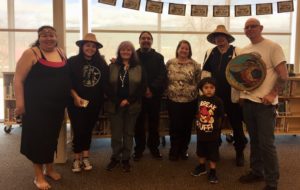
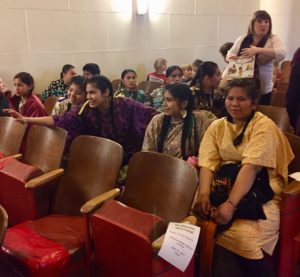
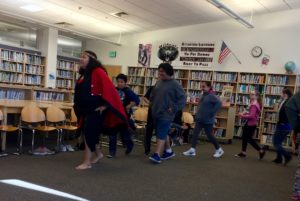 A lot of the work of being an author is the dull and dry sitting at a desk (even when that desk is in a tree) and writing day after day. But every now and then an event comes along that you know you’ll remember forever. The American Indian Cultural Festival in The Dalles last week was just such a moment. It was a celebration of literature and poetry and music and dance. It involved a group of books that I admire and authors I feel honored to share the stage with: Elizabeth Woody, Oregon’s Poet Laureate, Craig Lesley, acclaimed author of contemporary western literature, and National Book Award winning writer Sherman Alexie.
A lot of the work of being an author is the dull and dry sitting at a desk (even when that desk is in a tree) and writing day after day. But every now and then an event comes along that you know you’ll remember forever. The American Indian Cultural Festival in The Dalles last week was just such a moment. It was a celebration of literature and poetry and music and dance. It involved a group of books that I admire and authors I feel honored to share the stage with: Elizabeth Woody, Oregon’s Poet Laureate, Craig Lesley, acclaimed author of contemporary western literature, and National Book Award winning writer Sherman Alexie.
I was lucky enough to spend time with an adult book club and share a poetry reading with some truly outstanding young poets. I got to hear the culture club from Lyle school in Washington give their very first performance in the Sahaptian language with traditional dancing. They were simply amazing. I’m so proud of all they’ve accomplished in a year. I meet with some avid writers in the North Oregon Juvenal Detention Facility, and best of all I got to dance with the Taholah drum group from the Quinault Reservation. My favorite part of the whole thing was the series of classrooms who came to hear me and the Taholah drum group speak. They had all kinds of great questions about the culture and art of the Quinault and Makah and the practice of tribal whaling. It was the sort of mind-opening conversation that cultural festivals are made for. I am very grateful to Julian Peterson and Marko Black and all the tribal dancers from Taholah who shared their songs and prayers and dances so generously, and who invited the students to dance and drum along so whole-heartedly. I know those are memories the students will always cherish.
Thank you to Jim Tindale the librarian at The Dalles School District who made this all happen in 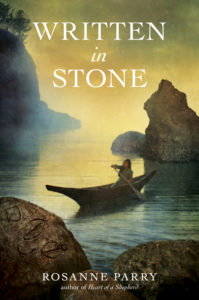 conjunction with the great booksellers at Oregon’s oldest bookstore Klindt’s who sold all the books and hosted many of the events. Tina Ontiveros is the manager at Klindt’s and Joaquin Perez is the owner. The fundraising for this event was truly a community affair with donations coming from area schools and libraries, educational foundations, local congregations, Oregon’s poet laureate program, the Wasco County Cultural Trust, the Ford Foundation, the Meyer Memorial Trust, and the Confederated Tribes of the Grande Ronde. It’s inspiring to see so many community members come together in support of literacy and the cultural understanding of our local American Indian communities. Thank you!
conjunction with the great booksellers at Oregon’s oldest bookstore Klindt’s who sold all the books and hosted many of the events. Tina Ontiveros is the manager at Klindt’s and Joaquin Perez is the owner. The fundraising for this event was truly a community affair with donations coming from area schools and libraries, educational foundations, local congregations, Oregon’s poet laureate program, the Wasco County Cultural Trust, the Ford Foundation, the Meyer Memorial Trust, and the Confederated Tribes of the Grande Ronde. It’s inspiring to see so many community members come together in support of literacy and the cultural understanding of our local American Indian communities. Thank you!
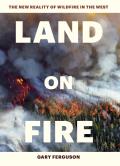 Ordinarily I recommend only children’s books on my blog, but in view of the fires which are burning hundreds of square miles of my home state, including some of my very favorite places in the wide world, I’d like to recommend a book by my friend Gary Ferguson. He has written dozens of books about the wilderness and its role in our lives. His book just out this summer is called Land on Fire. Its a well-researched look at how we got into our current cycle of catastrophic fires year after year, through decades of fire suppression and record draughts. It would be a great book group read and a worthwhile text for high school and even middle school science classes.
Ordinarily I recommend only children’s books on my blog, but in view of the fires which are burning hundreds of square miles of my home state, including some of my very favorite places in the wide world, I’d like to recommend a book by my friend Gary Ferguson. He has written dozens of books about the wilderness and its role in our lives. His book just out this summer is called Land on Fire. Its a well-researched look at how we got into our current cycle of catastrophic fires year after year, through decades of fire suppression and record draughts. It would be a great book group read and a worthwhile text for high school and even middle school science classes.
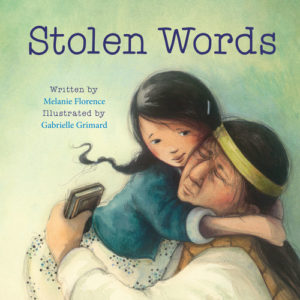 Writing about the ravages of colonial control over First Nations in the United States and Canada is difficult enough when addressing adults. It’s even more challenging when presenting material to the youngest readers. How to convey the seriousness and depth of pain without crushing the spirit of the child reader–it’s a huge challenge, and I admire any author who even attempts to take it on. Few come out with such a successful result as author Melanie Florence in her picture book Stolen Words about her grandfather’s forced enrollment in boarding school and the loss of his mother tongue. Ms. Florence tells the story of a young girl who innocently asks her grandfather how to say grandpa in Cree. He tells her about being taken away from home and punished at the boarding school for speaking his Cree language. Illustrator Gabrielle Grimard captures this beautifully representing the Cree language as a blackbird captured in a cage and locked away. It’s an image that conveys the sadness and brutality of the Canadian boarding school without presenting images too heart-breaking for young readers. The girl finds a Cree dictionary in her own school and brings it to her grandfather and the words on the page, again symbolically, take the fo
Writing about the ravages of colonial control over First Nations in the United States and Canada is difficult enough when addressing adults. It’s even more challenging when presenting material to the youngest readers. How to convey the seriousness and depth of pain without crushing the spirit of the child reader–it’s a huge challenge, and I admire any author who even attempts to take it on. Few come out with such a successful result as author Melanie Florence in her picture book Stolen Words about her grandfather’s forced enrollment in boarding school and the loss of his mother tongue. Ms. Florence tells the story of a young girl who innocently asks her grandfather how to say grandpa in Cree. He tells her about being taken away from home and punished at the boarding school for speaking his Cree language. Illustrator Gabrielle Grimard captures this beautifully representing the Cree language as a blackbird captured in a cage and locked away. It’s an image that conveys the sadness and brutality of the Canadian boarding school without presenting images too heart-breaking for young readers. The girl finds a Cree dictionary in her own school and brings it to her grandfather and the words on the page, again symbolically, take the fo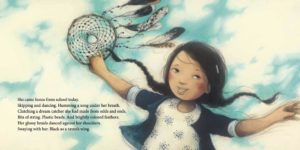 rm of blackbirds and fly free. It’s a simple tale–too simple for older readers certainly who need much more substance and a less tidy resolution. But for the youngest readers this is an important story of native language denied and ultimately regained, and a book well worth celebrating.
rm of blackbirds and fly free. It’s a simple tale–too simple for older readers certainly who need much more substance and a less tidy resolution. But for the youngest readers this is an important story of native language denied and ultimately regained, and a book well worth celebrating.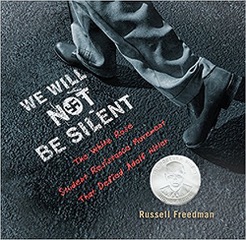 We Will Not Be Silent: The White Rose Student Resistance Movement That Defied Adolf Hitler is the story of Austrian teenagers Hans and Sophie Scholl who at the beginning of Hitler’s rise to power were glad to join the Hitler youth which they saw as a patriotic organization. But as the Hilter Youth moved from scout-like campouts to militia training and racist indoctrination, the Scholl siblings knew they had to resist at any cost. They put together The White Rose, a society devoted to making Hitler’s war crimes known and turning the tide ofGerman popular opinion against the Nazis. They succeeded, although it cost their lives. Freemen’s book is well researched and includes many historical photographs and yet it handles this very dark subject matter in such a way that most elementary school students can understand without being emotionally overwhelmed.
We Will Not Be Silent: The White Rose Student Resistance Movement That Defied Adolf Hitler is the story of Austrian teenagers Hans and Sophie Scholl who at the beginning of Hitler’s rise to power were glad to join the Hitler youth which they saw as a patriotic organization. But as the Hilter Youth moved from scout-like campouts to militia training and racist indoctrination, the Scholl siblings knew they had to resist at any cost. They put together The White Rose, a society devoted to making Hitler’s war crimes known and turning the tide ofGerman popular opinion against the Nazis. They succeeded, although it cost their lives. Freemen’s book is well researched and includes many historical photographs and yet it handles this very dark subject matter in such a way that most elementary school students can understand without being emotionally overwhelmed.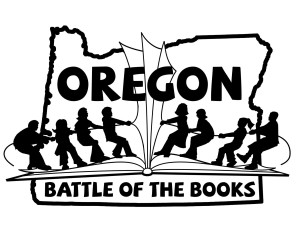 I’m a huge fan of Oregon’s Battle of the Books program and I’ve just learned of a great opportunity to get the books your school library needs to participate for free.
I’m a huge fan of Oregon’s Battle of the Books program and I’ve just learned of a great opportunity to get the books your school library needs to participate for free.

 A lot of the work of being an author is the dull and dry sitting at a desk (even when that desk is in a tree) and writing day after day. But every now and then an event comes along that you know you’ll remember forever. The American Indian Cultural Festival in The Dalles last week was just such a moment. It was a celebration of literature and poetry and music and dance. It involved a group of books that I admire and authors I feel honored to share the stage with: Elizabeth Woody, Oregon’s Poet Laureate, Craig Lesley, acclaimed author of contemporary western literature, and National Book Award winning writer Sherman Alexie.
A lot of the work of being an author is the dull and dry sitting at a desk (even when that desk is in a tree) and writing day after day. But every now and then an event comes along that you know you’ll remember forever. The American Indian Cultural Festival in The Dalles last week was just such a moment. It was a celebration of literature and poetry and music and dance. It involved a group of books that I admire and authors I feel honored to share the stage with: Elizabeth Woody, Oregon’s Poet Laureate, Craig Lesley, acclaimed author of contemporary western literature, and National Book Award winning writer Sherman Alexie. conjunction with the great booksellers at Oregon’s oldest bookstore Klindt’s who sold all the books and hosted many of the events. Tina Ontiveros is the manager at Klindt’s and Joaquin Perez is the owner. The fundraising for this event was truly a community affair with donations coming from area schools and libraries, educational foundations, local congregations, Oregon’s poet laureate program, the Wasco County Cultural Trust, the Ford Foundation, the Meyer Memorial Trust, and the Confederated Tribes of the Grande Ronde. It’s inspiring to see so many community members come together in support of literacy and the cultural understanding of our local American Indian communities. Thank you!
conjunction with the great booksellers at Oregon’s oldest bookstore Klindt’s who sold all the books and hosted many of the events. Tina Ontiveros is the manager at Klindt’s and Joaquin Perez is the owner. The fundraising for this event was truly a community affair with donations coming from area schools and libraries, educational foundations, local congregations, Oregon’s poet laureate program, the Wasco County Cultural Trust, the Ford Foundation, the Meyer Memorial Trust, and the Confederated Tribes of the Grande Ronde. It’s inspiring to see so many community members come together in support of literacy and the cultural understanding of our local American Indian communities. Thank you!